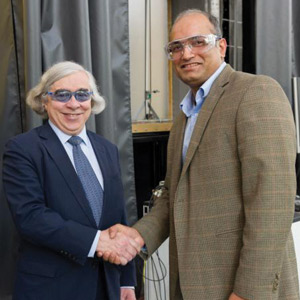Devesh Ranjan receives Early Career Award from U.S. Department of Energy

(Left) U.S. Secretary of Energy Ernest Moniz congratulates Prof. Devesh Ranjan.
Devesh Ranjan’s lab was recently visited by the U.S. Department of Energy’s Secretary Ernest Moniz, and Dr. Ranjan was congratulated on being chosen to receive the DOE’s Office of Science financial award for Early Career Research Programs. Dr. Ranjan, the first Georgia Tech professor to receive this award, was selected by the Office of Fusion Energy Sciences for his research topic “Discoveries in Blast-Wave-Driven Turbulence of Astrophysical Relevance.”
The award provides support to exceptional researchers during the crucial early career years. Dr. Ranjan’s research will provide certain first-ever data to support the international flow physics communities and addresses a question vital to the understanding of supernovae and fusion energy.
Dr. Ranjan has been an Associate Professor of Mechanical Engineering at Georgia Tech since July 2014. His research program focuses on the mixing of materials at extreme conditions, the physics of hydrodynamic instabilities, and advanced power conversion cycles –research efforts relevant to energy, environment, and inertial confinement fusion devices, for example. He earned a bachelor's degree from NIT-Trichy (India), master's and Ph.D. degrees from UW-Madison, and was a Fellow at Los Alamos National Laboratory and Assistant Professor at Texas A&M University. He is a recipient of the National Science Foundation CAREER Award, and the US AFOSR Young Investigator Award and was named J. Erskine Love Jr. Faculty Fellow in 2015.
Website Bonus Feature
Links:
This award:
http://science.energy.gov/early-career/.
http://www.me.gatech.edu/featured_Ranjan_DOE_Funding
Dr. Ranjan’s other research:
“The world human population is already more than 7 billion — a number that could exceed 11 billion by 2100, according to projections from the United Nations. This rising populace, coupled with environmental challenges, puts even greater pressure on already strained energy resources. Granted, there’s no silver bullet, but Georgia Tech researchers are developing a broad range of technologies to make power more abundant, efficient, and eco-friendly.”
Re major makeovers for power plants, introducing innovations that range from revamped power cycles to new infrastructure materials:
“In one project, steam is being replaced with supercritical carbon dioxide (SCCO2) as the working fluid to operate turbines and produce electricity” for use from dry cleaning to coffee decaffeination to solar power.
Dr. Ranjan is “working with Purdue University researchers to develop a new breed of heat exchanger that can withstand extremely high temperatures and pressures, a project supported by DOE SunShot funding.”
http://www.rh.gatech.edu/news/525961/12-emerging-technologies-may-help-power-future
U.S. DOE Secretary Munoz’ visit to GA Tech:
U.S. Energy Secretary Visit Highlights Georgia Tech’s Energy Collaborations
By Lance Wallace | MAY 24, 2016 • ATLANTA, GA
During a tour of the Carbon Neutral Energy Solutions Laboratory, U.S. Secretary of Energy Ernest Moniz receives a demonstration of a new design for a compact heat exchanger for supercritical carbon dioxide power cycle funded by the Department of Energy's Nuclear Energy University Program. Developer of the technology, Devesh Ranjan, associate professor of fluid mechanics in the School of Mechanical Engineering, explains the heat exchanger as Tim Lieuwen, Executive Director of the Strategic Energy Institute at Georgia Tech, looks on.
"We get lots of advice from Georgia Tech and we appreciate it," Moniz said.
Enjoyed reading Khabar magazine? Subscribe to Khabar and get a full digital copy of this Indian-American community magazine.
blog comments powered by Disqus











